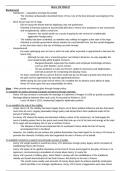Summary
Detailed Summary of AQA A Level Henry VIII's Domestic Policies
This is a detailed summary Henry VIII's domestic policies created using the 'Oxford AQA History Textbook for A Level: The Tudors: England ' by Sally Waller, 'Access to History: The Early Tudors: Henry VII to Mary I, Second Edition' by Roger Turvey, as well as lesson notes from an Oxford-educated h...
[Show more]




